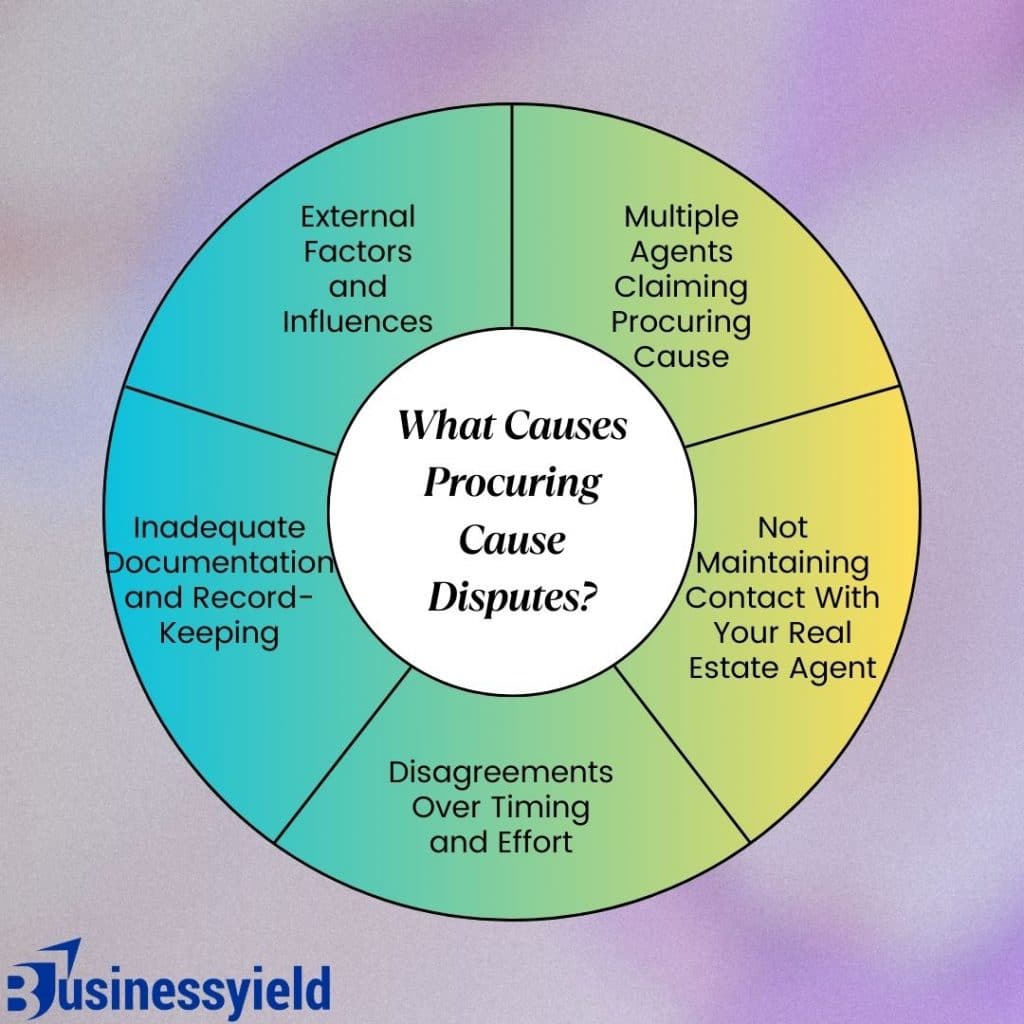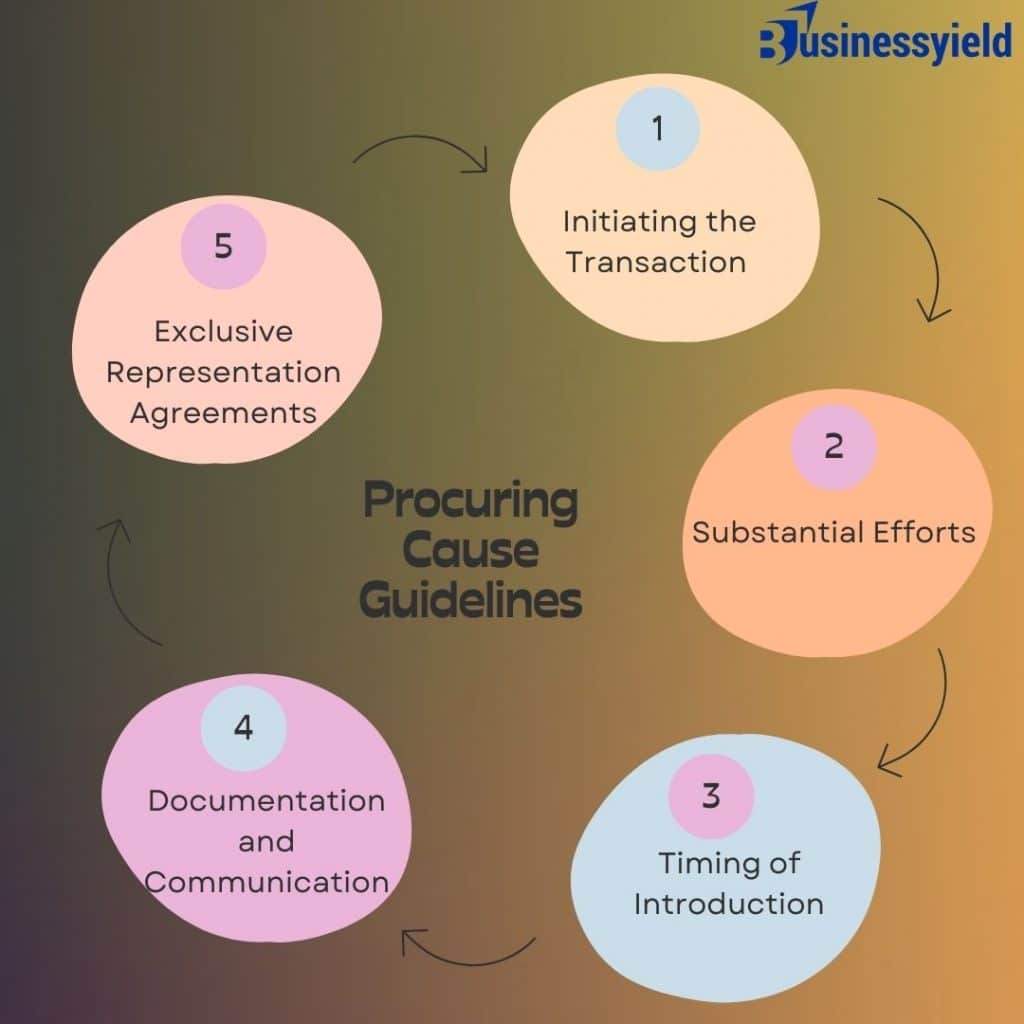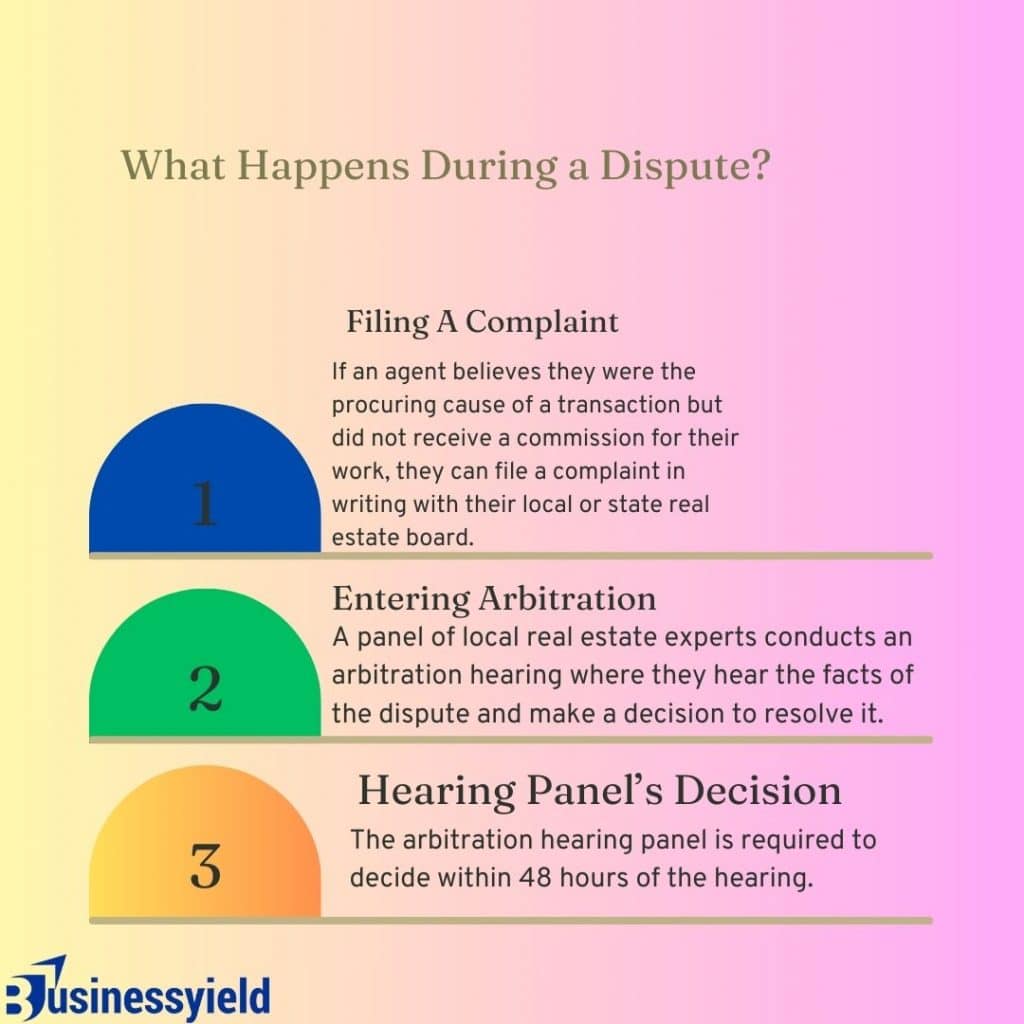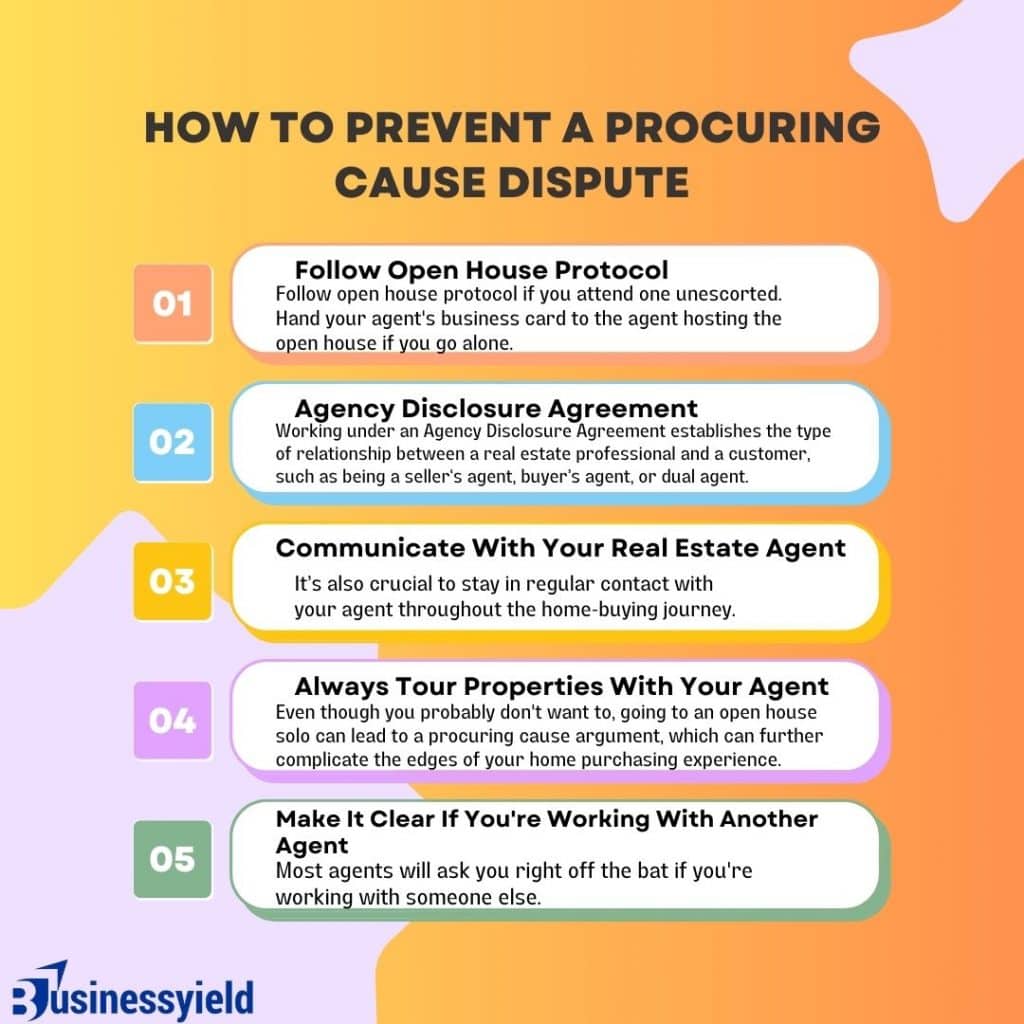When a new year starts, people often take some time to think and observe. I’ve had the pleasure and luck to work with, for, and promote Realtors® for almost 6 years and counting. Let’s say I’ve seen, heard, or been told it more than once, and it’s usually by a Realtor®! It’s like the Internet: if you hear something repeatedly, it must be true, right? Haha, maybe not so much. One of the most challenging things to understand is procuring causes. I have heard more examples of procuring cause in real estate, more definitions, and more explanations than Carter had liver pills (as “they” say), but rarely have I heard the right example, definition, or guidelines.
So, let’s demystify the procuring cause, what it means for real estate professionals, and how to prevent disputes before they even begin.
Key Points
- In real estate, procuring cause refers to the events initiated by the real estate agent who ultimately helped the buyer close the home.
- Filing a complaint, entering arbitration, and hearing the panel’s decision are some things that happen during disputes.
- Follow open house protocol and agency disclosure agreement, communicate with your real estate agent, always tour properties with your agent, and make it clear if you’re working with another agent. These are ways to prevent a procuring cause dispute.
What Is Procuring Cause in Real Estate?: Understanding the Impact
In real estate, procuring cause refers to the events initiated by the real estate agent who ultimately helped the buyer close the home. Agents who earned the commission are those who performed the tasks that led you to buy, according to Jim Mellen, a Realtor® with Re/Max Peninsula in Williamsburg, VA.
In most cases, that would be the agent who first showed you the house. But if you have cut ties with that agent and happen to see the house again with another agent, procuring cause could also mean the one who writes up the offer and helps you negotiate.
You can now see how tricky this situation can be.
Noelle Nielsen, a real estate agent with Re/Max Advantage Plus in Eagan, MN, says that real estate agents can be sued if they help a client buy a home while knowing that the client had already looked at the home while under contract with another agent. That contract had not expired or been officially ended before the purchase. However, the first agent would have to show that the second agent knew the buyer was already under contract when they bought the house, which can be troublesome.
In addition, agents who disagree with one another about commission percentages can go to their local real estate board for arbitration. If that happens, the buyer may be asked to testify as a witness and provide his version of events.
Being honest with your agent will help you prevent this sort of conflict. If you need to move on from the first agent, give them another try. Just be sure to let the second agent know the properties you looked at with the first.
Read also: 15 Must-Read Real Estate Investing Books for Beginners
What Causes Procuring Cause Disputes?

Disputes over procuring causes in real estate transactions are uncommon and can arise from various factors. These disputes often stem from disagreements regarding which real estate agent or broker is entitled to receive the commission upon the successful sale of a property.
However, understanding the common causes of property disputes is essential for all parties involved in a real estate transaction to navigate potential conflicts effectively. Below are some of the primary reasons I have encountered over the years that can lead to procuring cause disputes:
#1. Multiple Agents Claiming Procuring Cause
One of the most prevalent causes of disputes in procurement is when multiple agents or brokers assert their involvement in facilitating the sale of a property. This situation often arises when the buyer or seller has interacted with several agents throughout the transaction process. Determining which agent made the most significant contribution and initiated the chain of events leading to the sale becomes a point of contention.
#2. Not Maintaining Contact With Your Real Estate Agent
Sometimes, relationships between buyers and their real estate agents fizzle without a formal ending. These ambiguous endings can cause disputes because the continuity of the relationship between an agent and their client is a key factor in determining the procuring cause. If you believe you found a home on your own, but your old real estate agent still believes they are your agent, they could have a claim to be the procuring cause.
Here is a scenario I encountered during my first year as a real estate agent. I considered helping Sarah, the buyer who first contacted me, locate her ideal house. We exchanged emails at first, but Sarah stopped talking to me because she was too busy with her personal and professional life. Based on our early conversations, I kept looking for properties. However, I needed help locating alternatives without Sarah’s modified preferences and input. After some time, Sarah found the property independently, bought it through a different real estate agent, and completed the transaction. The fact that I was ignorant of Sarah’s choice caused me to squander time and money looking for homes that did not suit her needs, underscoring the significance of constant communication in real estate transactions.
#3. Disagreements Over Timing and Effort
Procuring causes disputes that often hinge on the timing and extent of an agent’s involvement in the transaction. Agents may disagree over who initiated contact with the buyer or seller, maintained consistent communication throughout the process, or played a significant role in negotiating the terms of the sale. Differences in perception regarding the value and effort contributed by each agent can escalate into disputes over procuring cause.
#4. Inadequate Documentation and Record-Keeping
Insufficient documentation and record-keeping practices can exacerbate procurement-related disputes by making it difficult to substantiate claims of involvement and contribution. Without comprehensive records of interactions, communications, and efforts made by each agent throughout the transaction process, establishing a cause becomes challenging. Lack of documentation leaves room for ambiguity and conflicting narratives, fueling disputes.
#5. External Factors and Influences
External factors, such as changes in market conditions, buyer or seller preferences, or unforeseen circumstances, can also contribute to procuring cause disputes. Agents may attribute the transaction’s success to external factors beyond their control, leading to disagreements over the extent of their contribution and entitlement to commission.
What Is the Key Factor for Proving Procuring Cause?
Whether a broker is, the procuring cause of a sale must be factually determined on a case-based basis. Many factors can impact the determination of a cause of procurement, but no one factor is determinative. Procuring cause is the interplay of factors that together demonstrate that the unbroken efforts of a specific broker were responsible for the buyer deciding to consummate the sale on terms that the seller found acceptable. In other words, a broker procuring the cause of a sale is a sine qua non of the sale—the sale would not have occurred but for the broker’s efforts.
Remember that just because a certain factor appears in a given fact pattern does not indicate the existence or absence of a procuring cause; rather, the totality of these factors must be considered. The reason is that identifying the cause relies heavily on components’ interactions rather than just one factor’s presence. In reality, the relative weight of each component and its placement in the case chronology determine whether a given factor is decisive or not. Nine distinct types of procurement cause factors can be used for organizational objectives. Here are the categories:
- The nature and status of the transaction
- The nature, status, and terms of the listing agreement or offer to compensate
- The roles and relationships of the parties
- The initial contact with the purchaser
- The conduct of the broker or agent
- Continuity and breaks in continuity
- The conduct of the buyer
- The conduct of the seller
- Other information
Procuring Cause Guidelines

Real estate professionals must understand and navigate the concept of procuring causes effectively. Procuring cause guidelines provide a helpful framework for this purpose. Certain general principles tend to apply, although they may vary based on local regulations and industry standards.
#1. Initiating the Transaction
The agent who initiates the series of events that result in a successful real estate transaction is usually regarded as the procuring cause. This could involve tasks like familiarizing the buyer with the property, scheduling property viewings, or assisting with negotiations between the parties.
#2. Substantial Efforts
The agent’s efforts and contributions must be significant and directly related to the completion of the transaction. Merely providing general information or incidental assistance may not be sufficient to establish a procuring cause.
#3. Timing of Introduction
Timing plays a crucial role in determining the cause of a purchase, as it affects when the real estate agent introduces the buyer to the property or starts actively working with the client. The agent establishing a relationship with the client or showing them the property could make a stronger claim.
#4. Documentation and Communication
Having well-documented records of the agent’s interactions and communications with the parties involved can strengthen their claim of responsibility for the deal. This can include keeping track of property showings, email exchanges, text messages, and other forms of correspondence.
#5. Exclusive Representation Agreements
If an exclusive representation agreement exists between a client and an agent, the terms of that agreement may dictate how procuring cause is determined. In such cases, the agent designated in the agreement is often given preference, but the actual circumstances of the transaction will still be considered.
How Do Real Estate Commission Disputes Happen?: Example
When you decide on a real estate agent, you’ll be asked to sign a buyer agency agreement, sometimes called a buyer-broker agreement. This document is a conditional contract between the agent, their brokerage, and the home buyer.
Parties enter these agreements with the best intentions, but sometimes disputes arise. For example, let’s say you signed an exclusive agreement with Mark, a real estate agent, and Mark has worked with you for months.
But you met another agent at a party who said they had a new listing that sounds like what you’re looking for. You might not mention Mark for fear of discouraging Nancy from showing you the home. Nancy conveys an offer on your behalf, and it’s accepted. You prepare to close, ignoring Mark along the way.
Of course, Mark finds out about the sale. They present their exclusive buyer agency agreement as proof that they’re entitled to a commission, even though you didn’t include them in the transaction. As the agent who performed the sale, Nancy feels entitled to the commission. Only one agent can be compensated, so now there is a commission dispute.
Read also: Is a Career in Real Estate Right for You?
What Happens During a Dispute?

When a procuring cause dispute arises between real estate agents, either agent can file a complaint with their local real estate board to request assistance resolving the issue. Each party involved can participate in an arbitration hearing to resolve the conflict.
#1. Filing A Complaint
If an agent believes they were the procuring cause of a transaction but did not receive a commission for their work, they can file a complaint in writing with their local or state real estate board. The agent filing the complaint is known as the complainant. The agent(s) that the complainant is in conflict with are known as the respondents. The complaint should include the names of all parties involved, the amount of money in dispute, and when the real estate transaction closed. The complaint must be filed within 180 days of the closing or 180 days of the complainant knowing about the issue.
If the Board determines that the complaint is subject to arbitration, it will notify all parties of the decision and set a date for an arbitration hearing.
#2. Entering Arbitration
A panel of local real estate experts conducts an arbitration hearing, during which they hear the facts of the dispute and decide how to resolve it. During the hearing, both sides can have legal representation, present case evidence, provide testimony from witnesses and subject matter experts, and cross-examine their opponents.
One critical factor used to gather evidence from both sides of a procuring cause dispute is the NAR’s procuring cause arbitration worksheet. All agents involved in the hearing may need to fill out this worksheet before the hearing. This list of questions helps the arbitration panel analyze the factors that can contribute to procuring cause.
#3. Hearing Panel’s Decision
The arbitration hearing panel is required to decide within 48 hours of the hearing. The decision will determine which party is entitled to the commission and specify the amount. However, in most cases, the panel will determine that one party is entitled to the entire commission, which is uncommon for the commission to be divided.
How to Prevent a Procuring Cause Dispute

No one wants a messy battle over commission at the time of sale. Fortunately, I have created a few ways to ensure a smooth, clear process with your agent.
#1. Follow Open House Protocol
Follow open house protocol if you attend one unescorted. Hand your agent’s business card to the agent hosting the open house if you go alone. Sign guest books with your agent’s name next to your own. This way, the open house agent won’t try to corral you or request personal information; your agent can follow up with them later.
Purchasing a home is one of the biggest transactions you will ever make, and your agent is there to help make it a smooth and successful experience. You probably don’t want this big moment to end on a sour note. Also, follow a few basic rules to ensure that your agent can get paid for their work and that no one has to endure any legal battles.
#2. Agency Disclosure Agreement
Working under an Agency Disclosure Agreement establishes the type of relationship between a real estate professional and a customer, such as being a seller‘s agent, buyer’s agent, or dual agent. It manages expectations, avoids conflicts of interest, and ensures compliance with legal and ethical requirements. This agreement protects the professional and the client by clearly defining their responsibilities and duties during the transaction.
#3. Communicate With Your Real Estate Agent
Staying in regular contact with your agent throughout the home-buying journey is crucial. An easy way to avoid disputes is to always contact your agent before looking at a home, regardless of how it catches your eye.
Don’t call listing agents whose names appear on a For Sale sign in front of a house you drove by without calling your agent first. They’ll contact the agent directly and schedule a time to see the house and negotiate on your behalf.
Read: Appraisal of Property: Guide To The Costs and Processes
#4. Always Tour Properties With Your Agent
Going to an open house solo can lead to a procuring cause argument, further complicating the edges of your home purchasing experience. The selling agent may mistakenly believe they are the procuring agent if you purchase the house if you speak with them without mentioning that you are working with your agency. Always do property viewings with your agent to avoid any misunderstandings. Agents will not be confused in this manner. You can tell your realtor exactly what you’re searching for in an ideal home when you can go around houses with them and express your likes and dislikes.
Remember to adhere to specific standards to prevent procuring issues if you pass an open house that you must visit independently. To ensure the listing agent knows who to call, please write down your agent’s name and phone number next to yours on any sign-up sheet available upon arrival. Make sure to mention your agent’s name and offer the listing agent’s business card to the agent hosting the open house. Being upfront about who is representing you when purchasing a home is crucial to minimizing disagreements.
#5. Make It Clear If You’re Working With Another Agent
Most agents will ask you immediately if you’re working with someone else. Agents are trained to ask you this question, but sometimes they don’t. Maybe they’re distracted or don’t want to hear your answer. Set them straight immediately. Promptly volunteer the information so you can work out any conflicts up front.
Procuring Cause on Real Estate Checklist
I have created a checklist on procuring cause for real estate agents, but remember that the specifics of procuring cause can vary depending on local laws and regulations, so it’s essential to consult with a legal professional or real estate expert familiar with the rules in your area.
Businessyield Procuring Cause Checklist
Bottom Line
When a real estate agent is involved in the chain of events that leads to the acquisition of a property, they are called the procuring cause of the transaction. Your real estate agent’s commission could be at risk if you unwittingly start a procuring cause issue through your interactions with other agents, such as when you visit an open house without them there. Knowing how to prevent these problems during the house-buying process will save all parties a lot of headaches after closing, even if NAR provides an arbitration process to settle them.
While it’s true that collaborating with a single reliable REALTOR® can greatly reduce the likelihood of these types of conflicts, doing so is only the beginning of the process that begins with discovering your ideal property. If you are prepared to move forward, you can apply for a mortgage now.
Similar Articles
- What Kinds of Investing Can Help You Save?
- How To Make Credit Card Charge Dispute: Processes and Limits
- Do You Need A Business Attorney?






